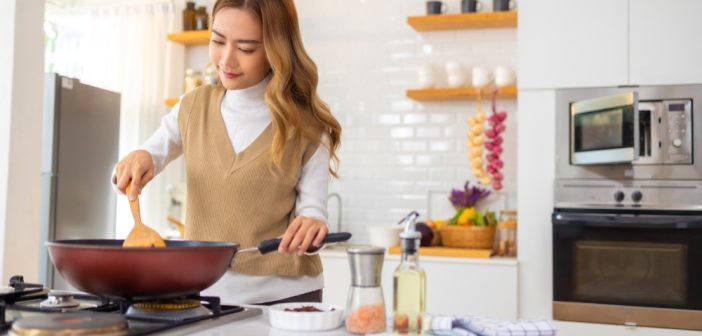As the holidays are quickly approaching and families and friends come together to share homemade meals, the importance of practicing safe cooking is more apparent. Unfortunately, one in six Americans suffers every year from foodborne illnesses.
Let’s reduce the number of people who become ill by working together to make sure we are preparing our food appropriately. Some helpful measures to take are cooking all food thoroughly, properly thawing meat, cleaning regularly, and double-checking expiration dates. By following these steps, we can all improve the odds of having a healthier holiday.
Cook Food Thoroughly
Will you be cooking a turkey or ham this holiday season? Either way, it’s good to be in the know regarding how long they need to be in the oven. Here are some of the more popular items and what their temperature should be when you pull them out of the oven:
- Ground meats and ham should reach 160°F.
- A whole chicken or turkey should reach 165°F.
- Fish and shellfish should reach 145°F.
Now that you know what temperature each food should reach, you can become even more of an expert by utilizing a few guidelines. Do the following to ensure your dishes reach the right temperature:
- Use a thermometer
- Wait to put food in the oven until it is done preheating
- Set a timer
It is essential that all foods be cooked thoroughly for a healthy outcome. To avoid overcooked or dry meat, remember to check on it every once in a while to achieve the perfect tenderness.
Thaw Food Properly
Have you ever wondered if you should warm frozen food up in the microwave to unthaw it or leave it under running cold water? According to the USDA, it’s best to unthaw it in the fridge. However, if you are running low on time, you can use the other methods. If you are going to use cold water, place the food in a sealed plastic bag. If you are going to unthaw the food in the microwave, cook it immediately after. Additionally, it’s important not to leave cooked food out for more than two hours to steer clear of entering the danger zone.
Keep Things Clean
There’s a lot of cleaning to do around the house during the holidays to make sure everything is neat and ready for guests. Cleaning your cooking surfaces and appliances in preparation for cooking for guests is just as important. Dirty surfaces can cause cross-contamination. The best way to prevent the spread of germs is by wiping down all surfaces with water and a cleaning solution and then sanitizing. Spending a little extra time cleaning can save you a lot of time from being sick.
Double-Check Expiration Dates
Checking expiration dates seems obvious, but it is often missed, especially for items that have been recently purchased. Unfortunately, stores sometimes sell items that are already expired or just about to go out of date. Before you buy things like meat, eggs, dairy products, or canned goods, check the expiration date and then check it one more time when you are ready to make a dish with it. Since expired food can cause bacteria that can spread in our stomachs, it’s wise not to consume anything after it is spoiled.
The holidays are all about having fun and enjoying company, so don’t let foodborne illnesses get in the way of your season. Take the time to learn how to thoroughly cook and measure temperatures on a variety of foods, be careful how you unthaw meat, clean your surfaces and appliances, and make sure your food isn’t expired to reduce your chances of getting sick.
A version of this article was published by The Daily Herald. It has been republished here with permission.




